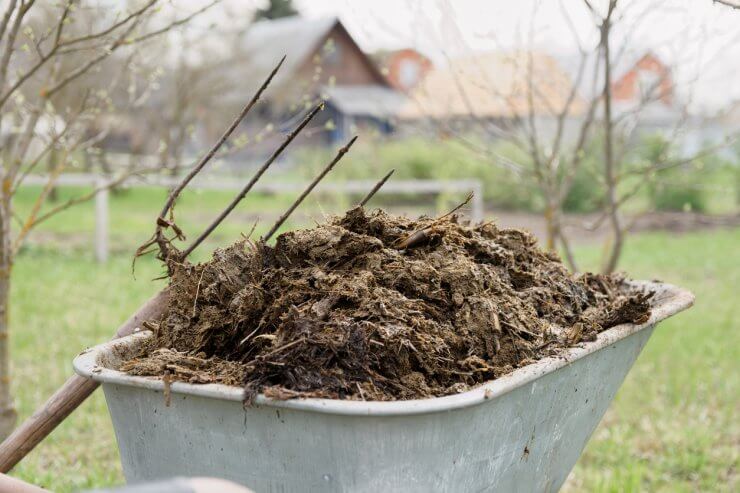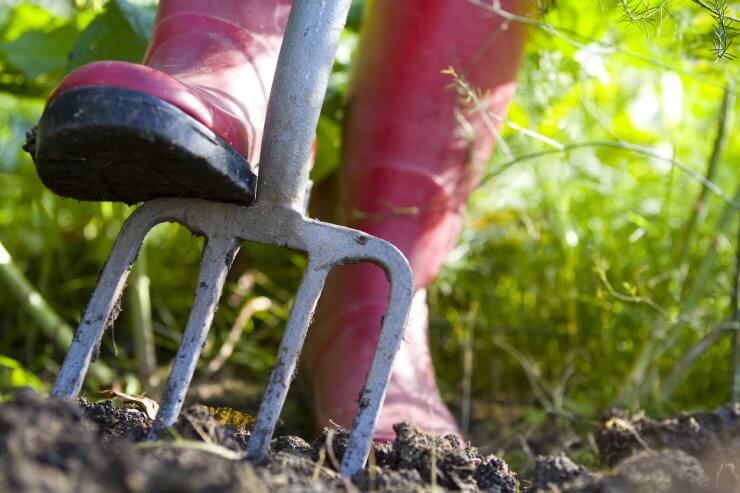
I might be dating myself here, but anytime I think about adding manure to garden beds, I have a vision of the scene from Back to the Future. You know the one – Marty (played by Michael J. Fox) is on a skateboard and getting chased by the bully Biff and his cronies. Biff is in his convertible car (top down) when Marty makes a quick turn. Biff tries to follow, but the car slams into a dump truck full of… you guessed it: manure. The manure falls out and fills the car. Talk about a smelly situation!
Manure has a long history as a supplement in the world of farming. Manure can improve soil quality and add nutrients to the soil. That’s true for home gardens, too. Manure slowly releases nutrients over time as it breaks down, making it an excellent fertilizer.
However, it’s not all raindrops and roses when it comes to adding manure to garden beds. If you don’t prep the manure properly, it can ruin your vegetables. Not to mention, it can smell pretty darn bad. I’m just going to guess that you don’t care to smell a garden full of manure outside your kitchen window.
Here are a few things to be aware of before you decide to garden with manure.
Discover 7 top tips for growing, harvesting, and enjoying tomatoes from your home garden—when you access the FREE guide The Best Way to Grow Tomatoes, right now!

Adding manure to garden beds: 5 mistakes you do not want to make
Mistake #1: Using fresh manure. Fresh veggies are good. Fresh manure is not. This isn’t so much about the value of nutrition fresh manure might bring to your soil. It’s that when you handle fresh manure, you expose yourself and your plants to a bevy of pathogens or parasites. Some of these can even be deadly, as in the case of E. coli. Call it personal preference, but that is not anything I care to take chances on. The exception here is that you can use fresh manure as long as you work it into the soil after the fall harvest so it can decompose over the winter.
Mistake #2: Not aging or composting the manure. Compost that poop! Composting your manure will eliminate many of the problems that come with fresh manure, including that “lovely” aroma. The same is true of aging. If you make the mistake of skipping this step, you could end up with excess weed seeds, the pathogens mentioned above, and fresh manure can be highly acidic.
Mistake #3: Rushing the process. Manure needs to get worked into the soil and time to decompose. Otherwise, it could burn your plant roots.
Mistake #4: Skipping the hand washing. Yes, I know this should be a given, but, we all know it isn’t. Hand washing is one of the easiest things we can do to help avoid contamination. And when you’re adding manure to garden beds, it’s all too easy to get sidetracked and forget this very important step.
Mistake #5: Neglecting to research your manure. Do you know where your manure comes from? Manure can contain weed seeds. Worse, though, herbicides and pesticides can pass through feed and into manure. While it’s not clear how probable this is, it isn’t entirely out of the question, either.
As long as you steer clear of these mistakes, you’ll likely be fine with adding manure to garden beds, whether that’s a raised bed or an in-ground garden.
What’s your experience with using manure as a fertilizer or soil additive in your garden? I’d love to get your thoughts in the comments.
Discover 7 top tips for growing, harvesting, and enjoying tomatoes from your home garden—when you access the FREE guide The Best Way to Grow Tomatoes, right now!





We raise a very nice garden but want another level if possible. I have access to aged feedlot cattle manure from a farmer rancher who puts it on his crops. Should I do that or stick to something in a bag?
Aged manure is richer in raw nutrients and organic matter. This is great for larger gardening projects. Bagged manure can be more convenient and consistent in quality. It is often ready to use and easiest for smaller gardens.
We have a few cows and compost poop. The problem is the weeds grow so big strong and healthy. How do you control the seeds?
We live in Panama so we don’t winter over. Thanks.
It takes about a month of keeping your compost pile at 145F (65C) temperature to kill many weed seeds. To make sure you’re pile heats up, add the right ingredients, keep up the moisture level and turn it over regularly.
Speaking of manure, I have a question. Our dogs use the bathroom in our yard. We want to use a portion of the yard for an area they will go in, and another area will be designated for raised garden beds. Our plan is to cover the latter space with some sort of gravel/rock and then put the beds on top before filling with soil. If our dogs have previously used that area to go to the bathroom do we have to worry about any sort of germs or pathogens getting in the plants? Hoping to plant a vegetable garden in this particular area.
I would clear the area for sure of anything new before adding raises beds. What’s in the soil you can’t really control, nor can you control the birds, bunnies or squirrels leave, so as long as you’ve cleaned up the ground before building beds and adding new soil on top that’s really the best you can do!
I dress my beds with manure in the fall and by spring they’re ready to go. We also add it to our compost pile and with all the kitchen scraps and yard waste it’s too big to turn. But over a few months we can dig out the most beautiful compost.
I live in a farm with chickens, rabbits and sheep. I compost chicken and rabbit poop all year. In fact I keep my compost area behind my chicken coops. As I add the chicken and rabbit poop, I also add kitchen scraps and even the skirtings from wool fleeces which contain bits of poopy wool. The chickens scratch all through it looking for treats. This helps to turn the compost. By spring, I shovel it into my wheelbarrows to be added to my kitchen garden at planting time. The stuff is gold. No composted manure smells. It rich and black and full of earthworms. And my vegetables grow beautifully. The wool bits help with maintaining soil moisture as well as adding nutrients to the soil. Farms are like mini ecosystems. And manure is an essential part of it.
What about products like Black cow? Are they already composted and safe to use?
Yes, Black Kow is already composted. This is true of anything you purchase in a bag.
I prefer Dried horse manure. It just doesn’t seem as acidic as say cow or even chicken manure. I’ve raised many a garden and once worked into the soil or compost it can produce some very nice gardens. You do need to be careful where you source any manure though or you are very correct, in saying, it can produce quite a few weeds.
I also prefer horse manure as it is less acidic. You must be careful where it is sourced. It does well composted over winter and makes black gold soil. I’ve never grown any better vegetables and fruit without it. My cantaloupe tasted like sweet sugar. I try to pick it up several times a year and dry not wet and compost it throughout the summer months too.